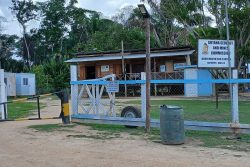Attorney General (AG) Basil Williams SC on behalf of government yesterday asked the Court of Appeal for orders to stay the effects of two of Chief Justice Roxane George-Wiltshire’s judgments on the December 21st no-confidence vote against government and to keep the president, the Cabinet and government in place until the appeals he filed last week are heard and determined.
Williams has applied to the court to grant the orders pending the appeal of the decision in the action he brought against Speaker Dr. Barton Scotland and Opposition Leader Bharrat Jagdeo and the decision in the action initiated by chartered accountant Christopher Ram. One of his arguments is that without a Cabinet, no funding can be made available to the Guyana Elections Commission (GECOM) for the holding of elections. Identical reasons were also listed in the affidavits in support by State Counsel Raeanna Clarke.
In each case, the court is being asked to grant an order for an interim stay of the effect of the judgment and order(s) of Justice George-Wiltshire until the hearing and determination of the Summons filed; an order for a stay of the effect of the judgment and order(s) until the hearing and determination of the appeal filed, a conservatory order, preserving the status quo ante that the President, Cabinet and all Ministers of the Government remain in office until the hearing and determination of the appeal; and such further or other order as the Court may deem just.
Up to press time last evening, there was no word on when the court intends to hear the appeals filed by Williams last Tuesday and those filed by attorneys Roysdale Forde and Olayne Joseph on behalf of General Secretary of A Partnership for National Unity (APNU) Joseph Harmon last Thursday.
In the Ram matter, Clarke in her affidavit said that she believes that the judge erred and misdirected herself in law in several instances, including the calculation of the vote and when she said that the passage of the motion effected the immediate resignation of the Cabinet.
She said that she has been advised that the framers of the Constitution by requiring the vote of a majority of all the elected members of the National Assembly as set out in Article 106 (6) have set the requirement as an absolute majority instead of a simple majority and that the absolute majority is calculated as half plus one and where mathematically, half of all the elected members of the Parliament would result in a fraction the method of calculation of the absolute majority is that the fraction is rounded to the next whole number and one added to result in a number greater than half.
Clarke said that she was further advised by her attorneys that the National Assembly comprises 65 members which is an uneven number and therefore using the half plus one principle would result in 34 being the absolute majority.
“I am further advised by my Attorneys-at-Law and verily believe that 33 is the number when calculated results in the absolute majority for an even number 64 member Parliament and cannot therefore also be the same number for a 65 member Parliament,” she said adding that the 33 votes in favour of the motion did not amount to a majority of all the elected members of the National Assembly.
She said that she was advised that in the circumstances the motion of no-confidence is void and has no legal effect to defeat the Government on a vote of no-confidence in accordance with Article 106 (6) of the Constitution.
She further contended that the effect of Article 106 (2) is that once there is a Government, “there must be a Cabinet; once there is a President there must be a Cabinet, and once there is a Parliament there must be a Cabinet. Therefore insofar as Article 106 (6) purports to sever the connection between Cabinet and Government it is inconsistent with the clear provisions of Article 106 (2).”
That article provides that “The Cabinet shall aid and advise the president in the general direction and control of the Government of Guyana and shall be collectively responsible therefor to Parliament.”
Further she argued that the word “notwithstanding” connects article 106 (7) to article 106 (6) of the Constitution and provides the timeframe for the resignation of the Cabinet which being part of the Government exists as long as the Government exists and the Cabinet would accordingly resign when the Government resigns. Further, she said the time for resignation of the President, Cabinet and Government is when elections are held and the President takes the oath of office following the elections as set out in Article 106 (7). Clarke also made reference to Article 171 (2) of the Constitution
“It is contended that the effect of the ruling of the Chief Justice that Cabinet ceased with immediate effect on the night of the no-confidence motion on 21st December, 2018 will mean that the Government will be unable to introduce any financial bills for passage because in accordance with Article 171 of the Constitution these bills require the recommendation and or consent of the Cabinet signified by a Minister. In these circumstances, the Government will be unable to fund the preparation and holding of elections by Guyana Elections Commission (GECOM) if the effect of the ruling of the Chief Justice is not stayed as prayed for herein,” she said.
Clarke contended that the status quo ante is that the President, Cabinet and Government will continue in their role and functions until the hearing and determination of the appeal herein.
“I am advised by my Attorneys-at-Law and verily believe that the Conservatory order is necessary to preserve the status quo ante as the period for the hearing and determination of the matter may expire before that time prescribed in Article 106 (7) of the constitution which requires that the President and Government remain in office and hold elections within three (3) months,” she said.
Further Clarke expressed confidence that the appeal has “good prospects of success” and therefore argued that the court ought to grant a stay and a conservatory order in order to ensure that if the appeal is successful it is not rendered nugatory.
She added that the court has held that it has jurisdiction to grant a stay of execution of a declaratory judgment in matters that would affect the public interest.
In the other matter, Clarke reiterated that the judge erred and misdirected herself in law and miscalculated the vote and therefore the no-confidence motion’s passage is void and has no legal effect to defeat the government.
The vote from then government parliamentarian Persaud in favour of a PPP/C-sponsored no-confidence motion against the APNU+AFC administration tipped the scales 33 to 32 in its favour.
Consequently, Scotland ruled that the motion was carried. Government accepted the ruling but subsequently asked him to reconsider and reverse it. However, Scotland declined and indicated that the court be approached for redress.
The first court action was filed by Berbice farmer Compton Reid against Persaud, Scotland and the AG. The court later granted applications for Harmon and Jagdeo to be added as interested parties. The case challenged the validity of Persaud’s vote given that he has Canadian citizenship. According to the Constitution, this would have made him ineligible to be elected as a member of the National Assembly.
The second case was filed by the AG against Scotland and Jagdeo. Harmon was also added to this case, which contended that the support of an “absolute majority” of 34 of the 65 elected Members of Parliament was needed for the confidence motion to pass.
The third case was filed on behalf of Ram and listed Jagdeo and the AG as the respondents. In this action, Ram asked the court, through his attorney Kamal Ramkarran, to uphold the passage of the no-confidence motion and to declare that the President and his Cabinet should immediately resign as a result.
On delivering judgments in the matters, the Chief Justice held that while Persaud was not “not qualified” for election to the National Assembly by virtue of his own acts in acknowledging allegiance and adherence to a foreign power to the sovereign state of Canada, in contravention of Article 155 (1) (a), his vote was still valid. She also ruled that the motion was lawfully passed by a majority vote of 33 to 32 and that this should have immediately triggered the resignation of the Cabinet, including the President, paving the way for elections to be held within the constituted three months period unless the National Assembly agrees on an extension.
Yesterday, the Chief Justice delivered her written decision to all parties in the matters.
Copies of the judgements were also sent to the Court of Appeal and Stabroek News understands that the court and all parties involved will meet and decide on dates for hearing.
Jagdeo’s attorney Anil Nandlall in a letter last Friday to the Registrar of the Chancellor urged the Court of Appeal to expedite the hearing of the appeals. Observers have said that since the clock is ticking on the three-month deadline for elections imposed by the Constitution, the court should treat all appeals emanating from the motion with urgency.









